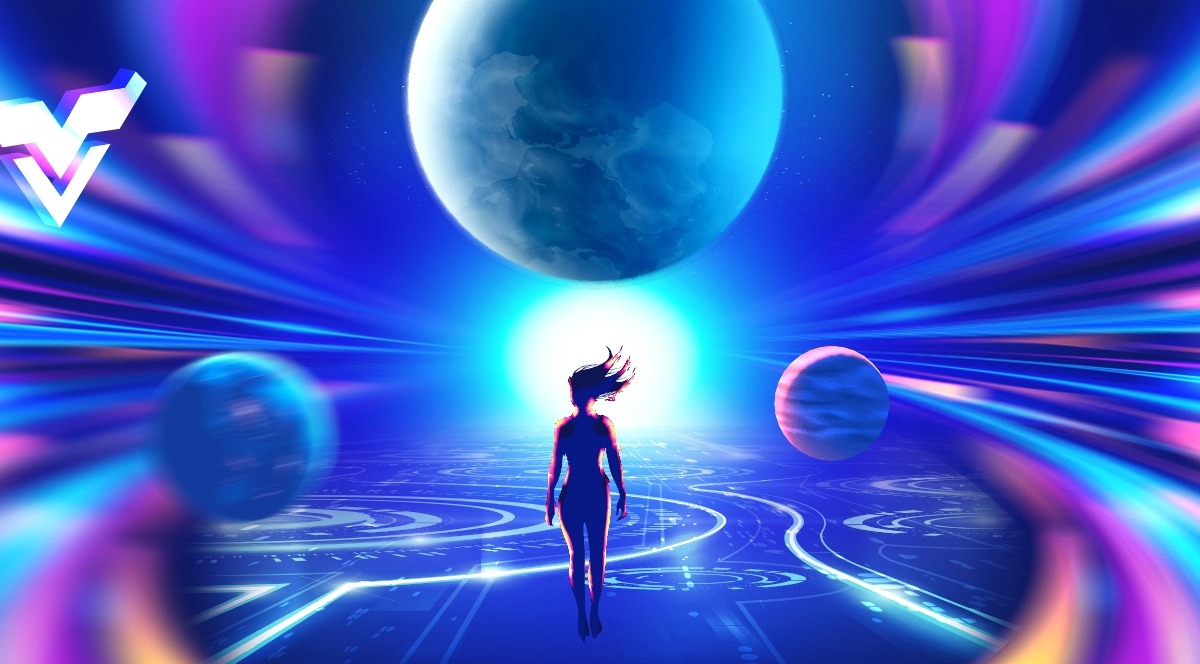Since Facebook changed its name to Meta in 2021, the term “Metaverse” has become a name that many people “hunt” and pay special attention to. So Is Metaverse the future of next techonology?

Not only creating a fever in the community, but Metaverse has been making a significant turning point when using AI applications to create a virtual world – where people can communicate and interact like the real world..
What is Metaverse and is Metaverse the Future?

Metaverse, also known as virtual super universe, is a digital space created thanks to the Internet and technology applications such as augmented reality (AR), virtual reality (Virtual Reality – VR), etc. Metaverse allows users to interact and have real-life experiences.
Also, the prefix “meta” means to go beyond. In 2021, CEO Mark Zuckerberg changed the name of the parent company Facebook to Meta. This shows the desire of the tech billionaire. That’s the future direction of the company beyond by building and delivering a Maximalist user experience that connects directly to a world known as the Metaverse.
The suffix “verse” stands for the word Universe, referring to the cosmic element. Technology companies use this term to describe a virtual world made up of the underlying Internet and supporting VR (Virtual Reality) or augmented reality (AR) tools. or even MR (Mixed Reality, a combination of VR and AR).
Therefore, the virtual universe Metaverse is not only a place for gaming and entertainment. This will be a future world, bringing technological innovation and changing the way we live and work with common problems such as education, economy, facility management…
Besides, as Metaverse develops, it will open up a more multi-dimensional user interaction online space than current technologies. Instead of just viewing digital content, users in Metaverse will be able to immerse themselves in the space where the virtual digital world is located.
History of Metaverse
Source
In the science fiction novel “Snow Crash” published in 1992, writer Neil Stephenson used the term Metaverse to describe a virtual world where people interact with each other through digital avatars. That world could rewrite value systems, social norms, and be free of economic and cultural rigidity.
This novel laid the foundation for the development of Metaverse today with the application of a series of advanced technologies. For example, the movie “The Matrix and Ready Player One”.
From 1992 to 2004, a number of companies such as There Inc, Blaxxun Interactive and IMVU developed different 3D virtual worlds with diverse forms such as: games, applications, social networks, etc. different characters so that users can interact and buy and sell items through digital payment. This concept is further expanded in the novel Ready Player One (2011) by writer Ernest Cline with Oasis – a comprehensive virtual world that exists parallel to the real world we live in.
Explosive event
In the past, we still hear a lot about concepts like artificial intelligence (AI), virtual reality (VR), but those are still quite unfamiliar technologies to many people. However, by October 2021, Facebook’s name change event along with a new development strategy has attracted the attention of the whole world.
Facebook has strongly stated that: “With Metaverse, we will be able to realize anything imaginable like meeting with friends and family, as well as working, learning, playing, buying and selling. shopping, creating – with completely new experiences that don’t really fit the way we think about computers or phones today…”
Featured Metaverse Projects
Axie Infinity (AXS)
Axie Infinity is a product of startup Sky Mavis with Vietnamese founder and CEO – Nguyen Thanh Trung. Launched in early 2018, this is a blockchain-based game that allows players to fight, collect, raise and build a kingdom of their own characters. In just 3 years, Axie Infinity is one of the hottest names in the gaming market in the world and is considered the flagship to bring the NFT series to players around the globe.
The biggest attraction of Axie Infinity lies in the fact that this game uses NFT (Non-fungible token) technology. Accordingly, the items in the game will be unique, cannot be faked or cloned like most other games. From there, these items can be bought and sold, transferred between gamers with their own virtual currency in the world of Axie Infinity.
Fortnite
Epic Games is known as one of the biggest and most powerful companies in the gaming and Metaverse market today. Fortnite has amassed over 10 million people logging in to watch DJ Marshmello give a virtual concert in the game. There the player will only see 99 other people who are participating online.
Currently, matches in the game Fortnite are still limited and the technology to be able to gather millions of people at once in a virtual space is not really ready yet. However, Fortnite also has the ability to gather and unite players on the platform, which will be a solid basis for Fortnite to grow more and more in the gaming and Metaverse segment.
Decentraland (MANA)
Decentraland is a virtual reality (VR) real estate platform developed based on the Ethereum Blockchain. The platform allows you to create a token-based economy for owning land in a virtual reality environment.
The advantage of Decentraland is that we can completely buy land, drive, study … and the land on Mana has a permanent ownership value. You can freely create content on the land without any worries. What’s more, Decentraland content is completely standalone, from 3D to rich games.
The Sandbox

The Sandbox (SAND coin) is a virtual world based on Blockchain technology built in 2018. The Sandbox allows users to create, build, buy and sell digital assets in the form of a game.
By combining the power of decentralized autonomous organizations (DAOs) and non-fungible tokens (NFTs), Sandbox creates a decentralized platform for a very large gaming community. . The founders of The Sandbox are also pioneers of the Blockchain game and Metaverse theme when they started getting into the field at a very early age.
The Sandbox is famously fun for being able to create games inside its own Metaverse. Sandbox users are given the ability to create content as NFTs through the VoxEdit tool. The 3D content to be created can then be sold or uploaded on the VoxEdit platform. This total freedom to create, play, and monetize has made Sandbox one of the best Metaverse NFT projects available on the market.
Bit Country (NUUM)
Bit.Country & Metaverse.Network is the Blockchain ecosystem and platform for virtual super universes, games and distributed applications created by users themselves. People like community managers, influencers, celebrities, and individuals can all create their own super-universes for members, fans, followers, family as well. like their friends.
As can be seen, with this project users can start their own Metaverse. If you like, you can actually make your own and this is one of the platforms that allows you to do that.
Star Atlas
Star Atlas is a massive multiplayer online game that takes place in a virtual Metaverse game. Currently Atlas is being built on Unreal Engine 5, allowing the game to have a real-time and high-quality environment like in a movie theater.
The built Star Atlas takes place in a sci-fi setting in the year 2620, where three major factions emerge and vie for resources and control. In it, humanity is a group of alien races that exist with sentient robots.
Star Atlas stands out for delivering immersive gaming experiences that span a variety of genres and combine cinema-quality gaming experiences. Star Atlas has the ability to earn virtual assets and can be exchanged for money in real life.
Until now, there is no Blockchain game capable of combining as many different games as Star Atlas. In fact, there are some games that offer the option of earning money through betting or fighting other players for virtual assets, exploring its virtual world and forming alliances. However, no game does all of the above at the same time.
Highlights of Metaverse

- Immersion: (Reality) Metaverse allows users to be completely immersed in a new virtual world with very high realism compared to the real world.
- Openness: (Openness) Metaverse allows users to connect or disconnect at any time.
- Sustainability: The ability to maintain and continue 24/24 on services or ecosystems in Metaverse.
- Economic System: This is the most characteristic feature of the Metaverse. Users can move assets between the Metaverse virtual world and the real world. In addition, there is also the ability to accumulate and increase assets for themselves.
Pros and Cons of Metaverse
Pros
Immersive experience
In 2020, the whole world is facing disaster – the COVID-19 pandemic. All countries have implemented social distancing plans to control the epidemic. Therefore, all activities are forced to stop and move online. Therefore, working remotely plays an important role.
All the global organizations started to make widespread use of online communication tools and the popularity of these tools is increasing. In addition, Metaverse has many advantages for children, especially from an educational perspective. With the help of such technology, learners can grasp abstract concepts easily in a more engaging way.
It can be said that the pandemic has played an important role in the popularity of these communication tools. And Metaverse technology is one step ahead of virtual instruments.
Metaverse provides a rich experience for attendees, and they can make the most of the 3D environment within it. They can interact with attendees just like they would in real life.
In a nutshell, Metaverse provides an incredibly enriching experience for its attendees, simply like no other.
Developing a virtual economy
The virtual economy is sure to become ubiquitous in today’s world of technology and science. With the expansion of virtual event technology, the virtual economy will also continue to develop in the coming time.
In this case, Metaverse acts as a platform for exchanging digital assets of the same economic value. In addition, Metaverse also dominates in introducing new activities and capabilities in the real and virtual worlds.
In addition, Metaverse promotes the widespread use of digital currencies, cryptocurrencies, tokens, digital currency ownership, blockchain games, and other financial applications.
Blockchain support
This is another advantage of Metaverse. Metaverse further strengthens the position and power of Blockchain.
Blockchain can be described as the foundation of digital currencies like Bitcoin and Ether. Along with it, Blockchain facilitates the development of NFTs. Metaverse promotes NFT-based games and provides a suitable environment for these blockchain games and environments.
Upgrade the application of social media
All social media platforms are two-way. Because platforms like Twitter, Facebook, Instagram… are basically always limited to interaction between screens.
Thus, a rich and distinctive social media interface allows users to interact with each other the same way they would in real life. A graphically intensive platform that enables face-to-face interaction of all uses for content created in a virtual environment. And Metaverse is the solution.
Cons
High technical requirements
A major drawback of Metaverse is the technical requirements as well as the advanced accompanying equipment.
Devices that come with Metaverse such as VR Headset, Blockchain, haptics… Along with that, to access Metaverse, users need a fast and stable internet connection.
Concerns about privacy
One of the biggest user concerns about digital technology is the security of the platform. As it requires personal information from the user. As a result, security and privacy breaches can make mistakes and cost founders their entire reputation. In addition, Metaverse is still developing, so the founders are still uncertain about the safety of these Metaverse platforms.
Bridging the gap between the real and virtual world
Although the purpose of Metaverse is to “pull” the real and virtual world together. However, it completely blurs the distinction between the virtual and real worlds. In addition, such technological advances have become an addiction. At the same time, influence how people view their real-life relationships.
Social and cultural impact
Another disadvantage of this new technology is the ability to create new norms that come with it. Users around the world are concerned about the possibility that Metaverse could destroy existing cultural values. They believe that the use of this technology can lead to the introduction of new cultural values that are different from existing ones, or even completely misleading.
Some Metaverse Terms

- Virtual reality: This is a simulated experience that may or may not be completely different from the real world.
- Assisted reality: Refers to all technologies that allow a person to view the screen and use Hands-free Controls to interact with the screen. Realwear devices fit into this category.
- Augmented reality: A term used to describe a computer-simulated environment. This technology uses the real world to set up and apply computer simulation technology to the view.
- Meatspace: This is the physical world where most of us spend most of our time.
- Mixed reality: This term describes a view of the real world with the addition of virtual objects that look and act like real objects. Thus the user can interact with both virtual and real objects.
- Multiverse: A hypothesis about the parallel existence of universes, which includes everything that exists and can exist: space, time, matter, energy and definitions. physical law. Theoretically, Metaverse could bring all these multiverses into one place and give users new experiences.
Metaverse’s appeal to tech companies
Technology companies are looking to the next future of the Internet when social networks and smartphones are saturated. Therefore, in addition to entertainment value, Metaverse also brings benefits to both users and developers. Here, participants are not limited by borders, distances and pioneers will have many advantages in the nascent market.
The fact that CEO Mark Zuckerberg changed Facebook’s name to Meta shows the billionaire’s ambition to dominate the world. Not only that, Zuckerberg is also producing Oculus – the world’s most popular VR headset, to get closer to the Metaverse. Similarly, Microsoft, Apple and Google are also pouring a lot of resources into virtual and augmented reality technologies.
Chip developer Nvidia is also not out of the game. To promote the Omniverse platform, back in April the company held a fully digital event.
Besides, China’s technology “giants” are also preparing for the new trend. Tencent, Alibaba and Baidu have filed nearly a hundred trademark applications related to Metaverse.
Which organization is building the Metaverse?
Metaverse will need a huge technological infrastructure, from computing power to computation, 3D visualization to content for financial and trading systems. Since Metaverse is seen as the next iteration of the Internet, every company with an Internet presence will want to build Metaverse as well.
Microsoft
According to The Verge, Microsoft is entering the race to build the Metaverse inside Teams, just days after Facebook rebranded itself as Meta in an effort to build a virtual space for both consumers and businesses. Microsoft will bring Mesh, a collaboration platform for virtual experiences, directly to Microsoft Teams next year. It’s part of a large effort to combine the company’s mixed reality, and HoloLens works with meetings and video calls that anyone can join thanks to animated avatars.
Tiktok
Bytedance, the company that owns TikTok, has entered the Metaverse – acquiring a VR-focused startup called Pico. This acquisition reminds many people of Facebook’s Oculus acquisition in 2014 and is expected to lead to a new wave in the VR field in China.
On September 3, Tencent Holdings, China’s largest game company, registered two trademarks ‘Timi Metaverse’ and ‘Kings Metaverse’ to pave the way for the future of the QQ messaging service and online game Honor of Kings. The company also introduced Wave as an online music platform to bring a new music trend to China.
Netflix
Netflix began tapping into the value of Metaverse after hiring Mike Verdu as its Vice President of Game Development. Netflix has acquired a list of intellectual property (IP) from movies to games and can use these brands to drive a larger solution for rich experiences and e-commerce. Recently, the movie streaming company has shown a growing interest in immersive entertainment and virtual reality (VR) products.
Netflix forayed into VR after the release of “Black Mirror: Bandersnatch” in 2018, which was hailed as a phenomenal success with its immersive storytelling style. The online giant also entered the video game market after releasing Black Mirror, Stranger Things, Squid Game to compete with rival platforms like Microsoft Gamepass and Sony Playstation Now.
Disney
On November 10, 2021, Walt Disney (DIS.N) CEO Bob Chapek said the entertainment conglomerate was preparing to make a technological leap into a virtual reality world for the first time ever seen by developers. science fiction writer created. Interviewing with CNBC, Bob Chapek envisions Disney’s Metaverse (virtual multiverse) as an extension of the Disney streaming service, through a new form of storytelling he calls ‘holographic canvas’.
Chapek assured investors that Metaverse is in line with the direction of Disney, which is an animation studio with a history of technological innovation dating back nearly a century. When Steamboat Willie came out, it was considered the first animated feature with synchronized sound.
Nike
According to information from CNBC, Nike has just filed a number of new trademarks that show its intention to produce and sell virtual goods (shoes and clothing). In addition to new registrations for trademarks, Nike is also looking for personnel in this area. According to Nike’s job posting, the company recently posted a job opening for a virtual material designer for footwear along with other virtual design positions.
Apple
Apple is also said to be preparing to “clear the way” to launch a similar device. According to sources, the “Apple house” smart glasses are expected to sell for about $ 2,000. These are the starting devices for users who want to participate in the Metaverse experience.
Speculation surrounding Apple’s development of AR and VR wearable technology is nothing new. They’ve been out since at least 2013. CEO Tim Cook himself bet on wearable technology, when early signs suggested the product was a bargain.
Apple has built a company around a series of core values, including the evolution of customer experience and trust. But will Apple still retain its monopoly when it comes to faith in the technology of the virtual universe Metaverse? Although Apple has lagged behind the likes of Meta (Facebook), Alphabet (Google) and other players in the race to launch the first AR and VR devices, Apple is never late “when the day comes.” The party begins.”
The giant Google joined very early in this metaverse race by acquiring many related technology companies as well as developing hardware and software devices, such as: Google Glasses, Google Cardboard…
Google started the headphone craze in Silicon Valley after introducing Google Glass in 2013. The experiment wasn’t well received, but Google didn’t give up.
In 2020, Google acquired North, a startup specializing in lightweight AR glasses, the spiritual successor to Google Glass. Google also established Google Labs that can focus on AR/VR development. oogle is developing a new AR headset called “Project Iris”.
In addition to the above companies, Intel, Qualcomm, Alphabet, Coinbase, Electronic Arts, Samsung, Adobe, Alibaba, PayPal and many other companies are also involved in building Metaverse.
Real-world Metaverse app

Metaverse – The future of the internet
Realizing the importance and value of Metaverse, many businesses have been applying this platform to serve the diverse needs of customers.
Health care
Historically, primary physicians were the first to use AR technology to collaborate. For example, Microsoft’s mixed reality headsets enable surgeons around the world to collaborate and support each other in the surgical procedures of difficult cases that require expertise.
h tiến hành phẫu thuật cho các ca bệnh khó cần chuyên môn cao.
Sports and entertainment
In the game company Unity, Peter Moore launched a platform called Unity Miracast. This platform helps to mirror professional sports in 3D in real time.
In it, the camera will capture the athletes competing on the field and this data is used to create twins on a digital platform. From there, users can watch online 3D broadcasts of entertainment sports matches.
Application in education and training
NASA uses AR and VR on the space station to remotely control robots or complete maintenance tasks with AR support. In one particular project, astronaut Scott Kelly used a Microsoft HoloLens headset to conduct ISS training and prepare for future missions. During these tests, a member of mission control on Earth streamed Kelly’s field of view through a headset and also plotted images displayed in 3D on the astronaut’s HoloLens screen.
The Future and Challenges of the Metaverse

“The huge potential market is a lucrative piece of cake for the big guys to enter right now”
A Bloomberg report estimates the Metaverse market value will reach $800 billion by 2024. According to research firm IDC, the global virtual reality device market will grow by more than 50% this year, expected to ship. 9 million devices in total. By 2025, this number could reach 28.7 million devices.
In May 2022, on Roblox, a popular children’s gaming platform, a digital version of a Gucci bag sold for more than $4,100 – more expensive than the real version.
Not only that, many companies in health, entertainment … have used Metaverse for distance training.
In addition, Metaverse can provide an opportunity for users and brands to interact, jointly consolidate and create content from the unexplored potential of the virtual marketplace. This is predicted to completely change the current consumer experience and create a breakthrough era of UGC (User-Generated Content).
Survey from Meta shows that 71% of users appreciate that brands include diversity and high relevance in the actual customer experience, but at the same time 54% of users also feel that It is not easy to be in tune with a Digital Marketing market that is increasingly “diluted” in terms of content.
Although the Metaverse offers a lot of potential, there are still many things that remain unanswered.
In addition to the potential to look forward to in the future, Metaverse also brings some barriers. Because Metaverse is still not really booming and the software and devices are not ready.
Metaverse also requires computational power. At the same time, it takes a large human resource such as engineers, designers, administrators… to be able to operate Metaverse. What’s more, Metaverse will likely benefit from smart city networks that underpin powerful computing infrastructure.
FAQs about question “Is Metaverse the Future”?
What will people have to trade when participating in Metaverse
Besides, the development of Metaverse is still controversial. The experience of using Metaverse will create new problems for society. Users will have a vivid immersive feeling as if they are directly living in the virtual world and from there, they will forget about reality. Teenagers of growing age can be adversely affected by being absorbed in the Metaverse. In addition, many people can take advantage of this to produce addictive ‘digital drugs’.
On the other hand, a fully functional Metaverse can take years and huge research investment costs. According to experts, potential risks related to Metaverse can be mentioned as cybersecurity risks, proprietary technology and controlled by big players.
Is Metaverse like virtual reality?
Metaverse is not like virtual reality. As an investor Matthew Ball explained during the chat, “Calling virtual reality Metaverse is like saying that the mobile Internet is an app.”
He compares Metaverse’s developments to the way the iPhone and the app store represent changing moments for the mobile Internet. “You could say that the mobile Internet, which has been around for 15 years, is entering a new phase,” he said. “His view is that in just the last few years, not only have new experiences emerged to make that happen, but the core underlying technologies required have begun,” Ball said in a conversation with the Post. become reality, not science fiction.”
Is Metaverse the future and a Good Thing?
Metaverse is a place where we can effectively learn, build, play, communicate and collaborate with anyone on earth. At the same time, Metaverse makes the world smaller by bringing us together regardless of our geographical location, and more importantly by allowing for more opportunities.
Used properly, the metaverse can bring people closer together than ever before, giving us new opportunities to connect regardless of language or location differences. That could be the beginning of new environments where we can build entirely new economies based on a shared allocation of value. Metaverse fans describe it as the beginning of a new era where experiences are built by people, for people, in an increasingly accessible setting.
However, there are also potential problems to deal with with the metaverse, such as the risk that we might struggle to track and prevent crime in a decentralized world. As a species and global community, it is up to us to use the metaverse’s abilities for good.
Is the Metaverse sustainable?
Metaverse has been an incredible and exciting opportunity for many people. Many analysts believe it will create a host of new opportunities in the form of new economies, new work environments and new opportunities to connect with others. However, like any technology, the metaverse requires careful consideration and implementation to be truly sustainable.
To stay true to those values and ensure long-term benefits, anyone working on the future of the metaverse will need to make sure they’re following certain guidelines. Eg:
- Be environmentally conscious: The technology with which we create the metaverse can help create positive changes and opportunities to save the planet. However, we need to ensure that any investment made in this technology takes into account the needs of the environment. For example, companies may need to consider how they will power the data centers responsible for the metaverse environment.
- Social Ethics: A central concept of the metaverse is that the digital world must be accessible and open to all. No one has more control over the metaverse than anyone else. We should all have an equal voice and respect in the metaverse. Social ethics need to be maintained in the metaverse.
- Healthy Economy: As the world continues to grow and evolve, the metaverse needs to support the growth of new economies and the continued success of existing environments. A strong metaverse context should not only be economically beneficial to a portion of the community, but also provide equal opportunity for all.
Who owns the metaverse?
While no one owns the metaverse itself — just as no one owns the internet today — there are certainly people or organizations with special influence in this space such as companies like Meta, Microsoft, Unity, Epic Games, Roblox and others want to be among them, which is why they are pouring billions of dollars into making sci-fi dreams come true.
Try to imagine the metaverse like a planet, moreover a universe without limits and without an owner. Everyone will participate in owning and building each part of it, these parts of the world will soon connect to each other through defined standard protocols. Big companies, “Big tech” will be the ones to shape and hold important parts of this world. This is considered a fertile land, rich in untapped resources.
Is Metaverse a Technological Revolution?
Although hailed as the next revolution of technology, perhaps the big boys are overestimating the metaverse or it is too early to judge everything. Firstly, we can look from the case of Facebook, the company officially changed its name to Meta in the context of facing a series of public relations crises and tightening management of executive agencies related to rights. privacy and cryptocurrencies. This action is probably just a ploy to divert public attention to the metaverse as a way to refresh the brand.
However, in fact, the metaverse race has been around for a long time as mentioned in the article and it is not too new in the technology world. Next, the emergence of the metaverse world coincided with the explosion of VR / AR virtual reality devices, NFT, and Crypto currency (cryptocurrency) which is still controversial today.
The barrier that makes it difficult for the metaverse to make big enough strides is a matter of policy. Legislators haven’t even solved the problems that social media alone brings, let alone another virtual society. The case where virtual currency like Bitcoin or game money after many years has not been widely accepted is the most typical example. Arguably Metaverse is also just an evolution from these pre-existing platforms to legitimize things.
What do skeptics say about the Metaverse?
While companies race to catch up, some analysts are cautious. Donnie Teng, technology expert at Nomura Securities, warned that the hype surrounding Metaverse is just a way for companies to bring VR and AR technology to life in a more popular way.
“The concept has been around for quite some time, but it continues to be a hot topic. People are still exploring the possibilities without a clear answer,” Teng told Nikkei. Finally, experts say that there is not yet a good enough technology and application infrastructure to truly realize the dream of building a completely virtual Metaverse.
Epilogue
Surely there will be a long way to go for Metaverse to creep into every corner of everyone’s life. Metaverse is still just a concept of the future and not a boom time due to many legal and hardware barriers. However, we can’t deny the investment potential from the big guys that shows that Metaverse can completely become a trillion-dollar industry in the future. A space for business, entertainment, commerce and an ideal place to work.






